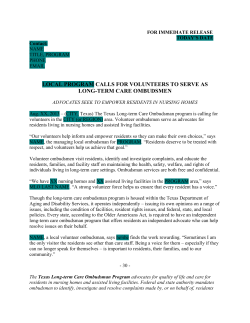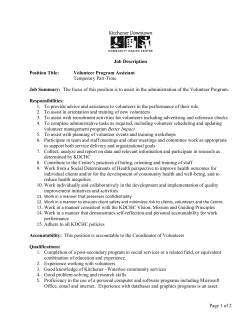
Jan-Mar - Florida`s Long-Term Care Ombudsman Program
Florida VOLUME 21 Ombudsman Outlook The Official Newsletter of Florida’s Long-Term Care Ombudsman Program MESSAGE FROM THE STATE OMBUDSMAN Leigh Davis State Ombudsman Florida Department of Elder Affairs Over the past quarter, program staff and volunteers were very busy. In January, the State Long-Term Care Ombudsman Council, Central Office staff, and Regional Managers met for a face-to-face meeting to discuss accomplishments made in 2014 and goals for 2015. On behalf of the program, I would like to thank Dr. Pargman, the State Chair, for all of his hard work in organizing and facilitating the much-needed conference. February proved to be equally as busy as I traveled the state and spoke at four of the Joint Training Conferences with the Agency for Health Care Administration. For our program, my presentation provided our year-in-review complaint data, core mission, and a general overview of our functions. The 2015 Legislative Session kicked off on Tuesday, March 2, and I spent most of the month traveling to and from the Capitol meeting with various legislators and their staff regarding our bill. Our ombudsman bill contains revisions to align the ombudsman statute to the requirements of the federal Older Americans Act and refocus our resources to resident-centered complaint resolution. In looking forward, April is National Volunteer Appreciation Month and is a special time that we set aside to honor our volunteers and announce the District Ombudsman of the Year Award recipients and the Statewide Ombudsman of the Year Award winner. Without our volunteers, we simply could not function, as they are the foundation of our program. I look forward to the announcement of the winners who will be honored at their respective April council meetings, featured in our April-June quarterly newsletter, and will also appear in the July/August issue of the Elder Update newspaper. I have been informed that several districts have already completed 100 percent of their annual assessments. This a huge achievement and demonstrates the dedication that staff and volunteers have for the program. The hard work put forth by all does not go unnoticed, and I cannot thank you enough for what you do on behalf of all residents living in long-term care facilities. Inside This Issue Conference....................................................................2 Appreciation............................................................... 3 Finance & Accounting................................................. 4 Education................................................................... 5 Summary of Complaints ............................................. 6 Volunteering .............................................................. 7 Toll-Free: 1(888) 831-0404 Website: ombudsman.myflorida.com Florida Long-Term Care Ombudsman Program 4040 Esplanade Way | Tallahassee, FL 32399-7000 Like us on Facebook LONG-TERM CARE OMBUDSMAN PROGRAM | 1 CONFERENCE 2015 State Long-Term Care Ombudsman Council Face-toFace Meeting Nancy King Legal Assistant Central Office The great mixture of talents, expertise, and personalities known as our State Council met in January in Altamonte Springs. Being able to brainstorm in a face-to-face meeting is essential for discussing new ideas and advocacy techniques to make our program function smoothly. Each workgroup met and prioritized goals that our program needs to accomplish for 2015. As you know, many changes have taken place within our program this past year, including reducing the amount of paperwork for volunteers. The assessment form is now user friendly and the consent form is being addressed thanks to our Advocacy Workgroup chaired by Lauren Eiel. Training modules are being finalized and they include updated information for better educating our new, potential, and certified ombudsmen thanks to our Training and Education Workgroup chaired by Gloria Goodman. In 2014, our volunteers received recognition for their years of service, and our focus will be on recruitment this year. The new exit interview process is working, and we are addressing any concerns provided as feedback from former volunteers thanks to our Recruitment, Retention, and Recognition Workgroup chaired by Mary Darling. The lengthy ombudsman activity report is being addressed by our Data Workgroup chaired by Rich Newton. Better tools for communicating with our Spanish-speaking residents are being developed. Also, issues were presented for the whole State Council to offer input on, such as a valid Power of Attorney, guardianships, seven-day contact, hurricane preparedness, staffing numbers, wording on the consent form, and determining capacity. Lively discussions ensued and valuable information was shared. Dr. Pargman, the State Chair, led the whole group in informative, lively, and educational discussions, and the wealth of knowledge shared was a benefit to all. Special bonds are made at these face-to-face meetings when we realize so many people from different walks of life are Continued on Page 3 LONG-TERM CARE OMBUDSMAN PROGRAM | 2 Continued from Page 2 joined in the program’s mission, which is to help these wonderful residents have the attention to their care that they deserve. Local council members should be very proud that their voices, through their State Representatives, were represented well on this very important advisory council. APPRECIATION The Long-Term Care Ombudsman Program Honors Volunteers With Years of Service Lapel Pins Shannon Knowles Communications Director Central Office The Long-Term Care Ombudsman Program is always looking for new ways to show ombudsmen volunteers our appreciation for their hard work and dedication. Many of our over 300 volunteers have served with the program for at least three years or more, and several have served for over 10 years. Their commitment and tireless efforts are what help make this program a success. Each year, the month of April is recognized nationally as Volunteer Appreciation Month. During this month, the program uses the opportunity to present volunteers with awards and announce the recipient of the Statewide Ombudsman of the Year Award. This year we are also focusing on those volunteers who will be presented with a years of service lapel pin and those who received one in 2014. The pins are in one, three, and five-year increments with one year being set in bronze, three years set in silver, and five years set in gold. Those volunteers with 10 or more years are presented with a small tabletop plaque with their name and years of service engraved on it. Volunteers who were presented their years of service pin in 2014 were very pleased with the recognition they received from their district managers and fellow ombudsmen. These volunteers were proud to display their pins on their program polo shirts, and those who will be presented with their pin this year are eagerly looking forward to receiving it. program. They are on the frontlines serving as advocates for residents in long-term care facilities day in and day out. On behalf of all program staff members, we extend a huge thank you to all of our volunteers who work tirelessly to serve Florida’s long-term care residents. Showing appreciation for these incredible volunteers is critical in fostering a positive environment within the LONG-TERM CARE OMBUDSMAN PROGRAM | 3 FINANCE & ACCOUNTING: Travel Made Simple Therese Schroer Deputy State Ombudsman of Operations Central Office Volunteer Ombudsmen are the heart and soul of Florida Long-Term Care Ombudsman Program (LTCOP) services. Residents of Florida’s long-term care facilities depend on volunteers and staff of LTCOP to ensure their rights are respected. LTCOP staff is committed to support the efforts of our valuable volunteers. We reimburse for travel expenses incurred while performing ombudsman duties. The processes to get reimbursements are not meant to be bothersome, but they are necessary and sometimes become challenging. within two days of when the travel period ends. Staff are required to submit routine travel reimbursements at least monthly. Any individual, staff, or volunteer receiving State funds is subject to audit or review for accountability purposes. Oversight and accountability are necessary, will keep us on track, and will ensure we are using funds appropriately. Assistance with this process is available from District, Regional, or Central Office staff; please reach out as needed. LTCOP volunteers advocate for those who need support to assure their rights are respected. Thank you for this selfless generous act; you enrich countless lives. When completing a travel reimbursement request, it is vital to provide every detail to relay the information for which you are seeking reimbursement. We need details to “draw a picture” of the trip. The form asks for details, but allows little space for entries. Please attach on separate papers any additional information which will clarify the travel you are reporting. Being very specific with the information is important. To ensure accuracy and to meet the required elements of practice, we have increased the review of all reimbursement requests. On the reimbursement form there is space for “mapped miles” and “vicinity miles”. All mileage must be shown from point of origin to point of destination and return, with verification from Florida Department of Transportation or Google Maps, for the distance from one address to another address. The “vicinity miles” category is often used when there are multiple addresses visited during one trip or trips within the town of origin are made. It is important to list the name and full address of the facility visited when claiming mileage for a case investigation, assessment, etc. Facility names are often repeated or are very similar in different communities. If there are maps or directions to print and attach, that is helpful. When possible and upon request, LTCOP office staff, District or Central Office, can assist with printing directions/maps and attach them to the reimbursement request. Volunteers are expected to submit reimbursement requests on a monthly basis, and are generally submitted at the monthly council meeting. LTCOP staff are required to submit travel reimbursements involving an approved Authorization To Incur Travel (ATIT) form, or using a P-card, LONG-TERM CARE OMBUDSMAN PROGRAM | 4 EDUCATION: 2015 Joint Training for Skilled Nursing Facilities and Assisted Living Facilities Betsy McAllister State Training Coordinator Central Office The 2015 Joint Training for Skilled Nursing Facilities and Assisted Living Facilities (ALF) is a forum for the Agency for Health Care Administration (AHCA) and leading long-term care experts to brief providers, advocates, and state surveyors on regulatory compliance with enforcement provisions. These eight one-day joint training events were held in four different locations throughout Florida. They highlighted major areas of change and supportive information to take back to the community for training and education. Leigh discussed the year-in-review complaint figures, the program’s core functions in an overview, and various discharge issues within assisted living facilities. She was very busy traveling the state presenting the mission of the program, which is to improve the quality of life for all Florida long-term care residents by advocating for and protecting their health, safety, welfare, and rights. We would like to thank the Agency for Health Care Administration, Leading Age Florida, the Florida Health Care Association, the Florida Assisted Living Association (FALA), and the FL ALFA Assisted Living’s Voice in Florida for sponsoring such an important event. The training highlighted the implementation of managed care, critical compliance topics, and problematic care areas with guidance for quality outcomes. State Ombudsman Leigh Davis traveled extensively throughout the state and participated in the Joint Training Conferences in Orlando on February 4, Tampa on February 6, Miami on February 17, and Tallahassee on February 20. ATTA-BOY “I would like to commend the Panhandle Council for successfully completing 100 percent of their assigned administrative assessments during the first quarter of the 2014-2015 reporting year. The council’s geographic area encompasses 14 counties (Bay, Holmes, Washington, Jackson, Gadsden, Calhoun, Liberty, Franklin, Gulf, Wakulla, Leon, Taylor, Madison, and Jefferson). Fifteen certified volunteer ombudsmen visited 86 facilities, provided information on residents’ rights, and consulted with individuals and long-term care facility staff. I am very proud of the council’s tireless efforts to improve the quality of life for long-term care residents. It is important that we get the word out to residents about the available resources provided by the program and to have a continued presence in our long-term care facilities. ” ~ Janice Harvey, District Ombudsman Manager “A special Congratulations and Thank You goes out to the South Central Council and staff! The council completed 100 percent of their administrative assessments by the end of the first quarter, December 31, 2014. This is an amazing accomplishment and does so much to make sure the voices of many residents are heard in their long-term care facilities. This accomplishment could not be made without the leadership of Terresa Lindstamer, South Central District Ombudsman Manager. She has set extraordinary goals for her district, and the dedicated volunteers have done a wonderful job helping to accomplish them!” ~ Robin Baker, Regional Ombudsman Manager “My mother, who is 95, was supposed to get out of rehab, but she was still not able to do anything herself. Ombudsman volunteer Ron Dickey helped me sort things out with the facility’s accountant so she could stay. Mr. Dickey helped me and he is so great!” ~ Ms. Curry, Tampa, Florida LONG-TERM CARE OMBUDSMAN PROGRAM | 5 SUMMARY OF TOP COMPLAINTS Under State law, the Long-Term Care Ombudsman Program is responsible for publishing its complaint data each quarter. The following data reflects verified complaints from cases closed between January 1, 2015 – March 31, 2015. The data also shows the number of these complaints resolved. Complaint Data Terms: Verified: It is determined after work (interviews, record inspection, observation, etc.), that the circumstances described in the complaint are generally accurate. Not Verified: It is determined after work (interviews, record inspection, observation, etc.), that the circumstances described in the complaint are not generally accurate. Verification is determined by the ombudsman. Resolved: The complaint was addressed to the satisfaction of the resident. Resolved is one of several disposition codes used by the program. Resolution is determined by the resident. To find out more about the Long-Term Care Ombudsman Program’s complaint or facility assessment data, call toll-free 1-888-831-0404, and ask to be transferred to a representative in your area. All services are free and confidential. Quarter 2 (January 1, 2015 to March 31, 2015) Top five complaints accepted in nursing homes: #Complaints #Verified #Not Verified #Resolved Dignity, respect - staff attitudes (0403) 69 42 27 47 Personal hygiene (includes oral hygiene) (0606) 55 33 22 37 Medications - administration, organization (0605) 53 34 19 36 Failure to respond to requests for assistance (0602) 50 33 17 34 Discharge/Eviction (0304) 46 36 10 8 Top five complaints accepted in ALF and AFCH: #Complaints #Verified #Not Verified #Resolved Menu (1003) 55 33 22 31 Medications – administration, organization (0605) 49 30 19 17 Dignity, respect – staff attitudes (0403) 46 24 22 24 Cleanliness, pests, general housekeeping (1102) 44 31 13 23 Privacy-telephone, visitors, couples, mail (0408) 28 15 13 13 Statewide Statistics Quarter 2 January 1 - March 31, 2015 Number of Beds 172,994 Number of Volunteer Ombudsmen 306 Facility Assessments 789 Facility Visitations 820 Complaint Investigations 1,687 *Reflects both initiation and closure dates that may overlap quarterly reporting periods. LONG-TERM CARE OMBUDSMAN PROGRAM | 6 VOLUNTEERING: LTCOP Student Ombudsmen Receive Recognition Janine Rogers Office of Volunteer & Community Services Department of Elder Affairs The Department’s Office of Volunteer & Community Services recently recognized two student volunteer interns in the Long-Term Care Ombudsman Program. They are Jeremiah Meinck and Willie Walden II, both from Orlando. Both young men contributed over 120 hours each to volunteer service in the program. Mr. Meinck is a student at the University of Central Florida who will graduate in the summer with a bachelor of science in Health Care Administration. He is a recipient of a Bright Futures Scholarship and a member of the National Society of Collegiate Scholars. His goal is to use the experience in the program, and his degree to work in revenue cycle management and medical delivery methods in health care. Mr. Meinck plans to maintain his volunteer status with the program after graduation. Mr. Willie Walden II is also a University of Central Florida student with plans to graduate in the spring with a Bachelors of Science in Health Services Administration. He is a Legacy Campus representative, a 4Ever Knights Ambassador, and a VITAS volunteer. In addition to his studies, he is a Senior Fiscal Assistant in the campus health center. Mr. Walden hopes to use his experience and education in the health care field. The Long-Term Care Ombudsman student internship program began in the summer of 2012. Each student volunteer intern who participates facilitates assessments of facilities and investigates complaint calls. In addition, they attend district meetings once a month and are fully certified as ombudsmen while in the program. If students are interested in this volunteer opportunity, they should contact the District Manager in their area to see if there is an agreement in place with their respective university. Bryan Morgan, the Ombudsman Program Recruiter, works with each student to expedite the training process and offer the support needed to manage university or college requirements. Morgan, who also contributed to this story, can be reached at the East Central District Office, 400 West Robinson Street, Suite N110, Orlando, Florida, 850-510-3920, or via email at morganb@elderaffairs.org. In Memoriam It is with a sad heart that we announce the passing of ombudsman volunteer, Meredith “Meri” Hamilton on Sunday, March 22. Meri had been advocating for residents as a valued ombudsman in the Treasure Coast office. Although Meri had only been a volunteer with the program since November 2014, she was considered a bright young star with a caring spirit. We extend our sincere condolences to her parents, Ron and Barbara. LONG-TERM CARE OMBUDSMAN PROGRAM | 7
© Copyright 2025









